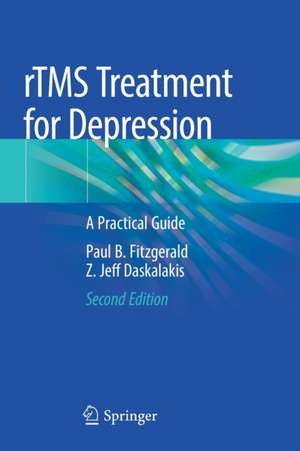rTMS Treatment for Depression: A Practical Guide
Autor Paul B. Fitzgerald, Z. Jeff Daskalakisen Limba Engleză Paperback – 26 feb 2023
| Toate formatele și edițiile | Preț | Express |
|---|---|---|
| Paperback (1) | 774.04 lei 43-57 zile | |
| Springer International Publishing – 26 feb 2023 | 774.04 lei 43-57 zile | |
| Hardback (1) | 900.14 lei 38-44 zile | |
| Springer International Publishing – 25 feb 2022 | 900.14 lei 38-44 zile |
Preț: 774.04 lei
Preț vechi: 814.78 lei
-5% Nou
Puncte Express: 1161
Preț estimativ în valută:
148.16€ • 160.99$ • 124.53£
148.16€ • 160.99$ • 124.53£
Carte tipărită la comandă
Livrare economică 21 aprilie-05 mai
Preluare comenzi: 021 569.72.76
Specificații
ISBN-13: 9783030915216
ISBN-10: 3030915212
Pagini: 197
Ilustrații: IX, 197 p. 19 illus., 17 illus. in color.
Dimensiuni: 155 x 235 x 17 mm
Greutate: 0.3 kg
Ediția:Second Edition 2022
Editura: Springer International Publishing
Colecția Springer
Locul publicării:Cham, Switzerland
ISBN-10: 3030915212
Pagini: 197
Ilustrații: IX, 197 p. 19 illus., 17 illus. in color.
Dimensiuni: 155 x 235 x 17 mm
Greutate: 0.3 kg
Ediția:Second Edition 2022
Editura: Springer International Publishing
Colecția Springer
Locul publicării:Cham, Switzerland
Cuprins
TMS and rTMS: An introduction to the Basic Principles of TMS and rTMS.- The History of TMS and rTMS Treatment of Depression.- The Mechanism of action of rTMS.- Acute rTMS treatment for MDD.- Acute rTMS treatment for MDD, clinical indications / patient selection.- Practical Issues in Treatment Provision.- Switching, Continuing or Ending treatment.- The Use of Deep Transcranial Magnetic Stimulation in Depression.- Theta Burst Stimulation (TBS) in rTMS Therapy.- Accelerated and Intensive rTMS Treatment Protocols.- Localization and Targeting of rTMS Treatment of Depression.- Treatment Intensity, the Resting Motor Threshold and rTMS Treatment Dosing.- Maintenance and Continuation Treatment.- rTMS Associated Adverse events, Safety and Monitoring.- Side Effects of rTMS Treatment.- The Use of rTMS in Other Psychiatric Disorders.- Equipment and rTMS Program Set up.
Notă biografică
Paul Fitzgerald is Professor of Psychiatry at Monash University and Director of the Epworth Centre for Innovation in Mental Health based at Epworth Camberwell in Victoria, Australia. He is a qualified psychiatrist, has a Masters of Psychological Medicine and research PhD. His main clinical and academic interest is in the development, evaluation and clinical translation of new therapies for mental health conditions. He has conducted over twenty randomised clinical trials of forms of brain stimulation in depression, schizophrenia, obsessive compulsive disorder, PTSD, autism and Alzheimer’s disease along with over 50 experimental studies. He has established multiple clinical TMS services, is a founder and board member of TMS Clinics Australia, and established Australia’s first TMS clinical training program. He has had continual federal grant support for almost 20 years and is currently an NHMRC Leadership grant holder.
Zafiris ‘Jeff' Daskalakis is the newly appointed Chair of the Department of Psychiatry at UCSD. He was formerly the Temerty Chair and Chief of the General Adult Psychiatry at CAMH. His research focusses on neurophysiological and treatment studies using transcranial magnetic brain stimulation (rTMS) and magnetic seizure therapy (MST). He has established Canada’s first TMS clinical training program and he holds or has held numerous federal operating grants and awards, including grants from the NIH and CIHR. He has received over $50 million in research funding as PI, has over 440 peer-reviewed publications, and is an editorial board member for Biological Psychiatry, Biological Psychiatry: Cognitive Neuroscience and Neuroimaging and an Associate Editor for Clinical Neurophysiology. He is also a member of the Brain and Behavior Research Foundation (formerly NARSAD) Scientific Council.
Zafiris ‘Jeff' Daskalakis is the newly appointed Chair of the Department of Psychiatry at UCSD. He was formerly the Temerty Chair and Chief of the General Adult Psychiatry at CAMH. His research focusses on neurophysiological and treatment studies using transcranial magnetic brain stimulation (rTMS) and magnetic seizure therapy (MST). He has established Canada’s first TMS clinical training program and he holds or has held numerous federal operating grants and awards, including grants from the NIH and CIHR. He has received over $50 million in research funding as PI, has over 440 peer-reviewed publications, and is an editorial board member for Biological Psychiatry, Biological Psychiatry: Cognitive Neuroscience and Neuroimaging and an Associate Editor for Clinical Neurophysiology. He is also a member of the Brain and Behavior Research Foundation (formerly NARSAD) Scientific Council.
Textul de pe ultima copertă
Repetitive transcranial magnetic stimulation (rTMS) treatment is increasingly a standard part of the management of patients with depression supported by a rapidly expanding research base. This new expanded and amended concise clinical guide will serve as a reference and practical tool for clinicians working with or learning about this treatment technique. The opening chapters provide basic information on the history and development of rTMS treatment and its mechanism of action. Use of the treatment in depression is then addressed in detail, with explanation of the evidence base and discussion of a variety of clinical issues. Side-effects of treatment are explored, and careful consideration is given to the establishment of rTMS treatment programs. There is an updated review of the use of a rTMS applications in other psychiatric conditions such as obsessive-compulsive disorder. New chapters in this edition address the use of deep TMS, theta burst stimulation, accelerated forms of rTMSand what to do in patients not responding to initial therapy. In addition, the various approaches to treatment targeting are addressed in detail. This book will provide the rTMS practitioner or interested generalist an up-to-date and comprehensive understanding of the field as well as provide considerable practical clinical advice.
Caracteristici
Concise guide for clinicians working with or learning about this treatment technique Considers the evidence base and a range of clinical issues Discusses establishment of rTMS treatment programs Reviews potential rTMS applications beyond depression
